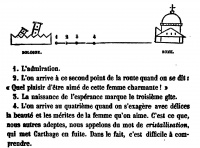Falling in love
From The Art and Popular Culture Encyclopedia
|
"Eros is the oldest of gods, says Plato. He is the god of love, lust, blind passion and sexual reproduction. If an arrow from Eros's bow strikes a target, the victim falls immediately in love. Eros's parentage is significant: he is the son of Aphrodite, goddess of love, and Ares, god of war. He is thus born out of beauty and belligerence, out of love and hate. Out of two opposites that are united nowhere else than in the most intimate space of the human psyche: the sexual act, and its abstraction: eroticism."--A History of Erotica (2011) by Jan-Willem Geerinck "[...] I am convinced that love cannot manifest itself if not on the base of a certain difference, that we're not falling in love with what's alike [...] An extreme age gap can generate passions of an unheard-of violence, racial differences retain its effectivity, and even the simple difference in language and nationality is not to be disdained. Two lovers should not speak the same language, they shouldn't be able to really understand each other" J'acquis la conviction que l'amour ne peut se développer que sur la base d'une certaine différence, que le semblable ne tombe jamais amoureux du semblable, même si en pratique de nombreuses différences peuvent faire l'affaire : un extrème différence d'âge, on le sait, peut donner lieu à des passions d'une violence inouîe, la différence raciale conserve son efficacité, et même la simple différence nationale et linguistique n'est pas à dédaigner. Il est mauv ais que des aimés parlent la même langue, il est mauvais qu'ils puissent réellement se comprendre, qu'ils puissent échanger par des mots, car la parole n'a pas pour vocation de créer l'amour, mais la division et la haine, la parole sépare à mesure qu'elle se produit, alors qu'un informe babillage amoureux, semi-linguistique, parler à sa femme ou à son homme comme l'on parlerait à son chien, crée les conditions d'un amour inconditionnel et durable. Si encore l'on pouvait se limiter à des sujets immédiats et concrets...ça pourrait encore aller, mais au-delà commence le règne de la désunion, du désamour et du divorce. --Serotonin (2019) by Michel Houellebecq |
|
Related e |
|
Featured: |
"Falling in love" is a mainly Western term used to describe the process of moving from a feeling of neutrality towards someone to one of love. The usage of the term "fall" implies many things: that the process may have been in some way inevitable or uncontrollable, risky or putting the lover in a state of vulnerability, that the process is irreversible, or all of these things, in the same way the word "fall" is used in the phrase "to fall ill" or "to fall into a trap". The term is generally used to describe an (eventual) love that is strong, although not necessarily permanent.
See also
- Limerence
- Infatuation
- Love sickness
- I Fall in Love Too Easily
- Attachment theory
- Dating
- Flirting
- Love at first sight
- Love sickness
- Puppy love
- Romantic orientation
- Transference
References
- Denis de Rougemont, Love in the Western World Pantheon Books, 1956.
- Francesco Alberoni, Falling in Love, New York, Random House, 1983
- Essays in Love, 1993, Alain de Botton



